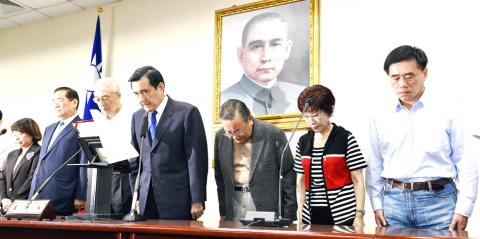President Ma Ying-jeou (馬英九) has reportedly decided to resign as chairman of the Chinese Nationalist Party (KMT) to take responsibility for the party’s crushing defeat in the nine-in-one elections on Saturday, but the news had not been confirmed by KMT spokesperson Charles Chen (陳以信) as of press time.
The news that Ma would make a “big announcement” at a meeting of the party’s Central Standing Committee on Wednesday to resign as chairman emerged on various media outlets almost simultaneously yesterday morning.
Chen said he was not able to confirm the reports, but added that Ma had explicitly told the party that he would never cling to the chairmanship and would take responsibility for the election results.

Photo: George Tsorng, Taipei Times
The KMT won in six of the nation’s 22 cities and counties, losing control of historical strongholds it held in Taipei, Greater Taichung and Taoyuan to the Democratic Progressive Party. It previously controlled 15 seats.
On Saturday, Ma approved the resignations of Premier Jiang Yi-huah (江宜樺) and KMT Secretary-General Tseng Tung-chuan (曾永權).
Taipei Mayor Hau Lung-bin (郝龍斌) said yesterday morning that he offered to resign as KMT vice chairman on Saturday night.
Hau said the election results are a warning from voters to the KMT, calling on the party to examine the message conveyed by the losses and strive to listen more attentively to what people have to say.
Hau said on Facebook that as an incumbent mayor who was responsible for campaigning for KMT Taipei mayoral candidate Sean Lien (連勝文), he takes responsibility for the loss in the capital.
If Ma resigns, Vice President Wu Den-yih (吳敦義), one of the KMT’s eight vice chairs, reportedly would take up the position temporarily until an election is held in three months to select a new chairperson.
Wu said he believes Ma has been deliberating whether he should step down as chairman, adding that to remain in the role would be more difficult than to resign because it was like “burning the candle at both ends.”
Defeated Greater Taichung Mayor Jason Hu (胡志強) said he would continue to serve the party as a vice chairman, although he had considered resigning when he learned of Hau’s decision.
In an interview with China Television, Hu said he would rather work with the party in this time of difficulty than resign.
The reason the KMT lost the election is because it did not understand the younger generation, Hu said.
“Young people take for granted what they are given and they think they are owed what they long for. If you give them an iPhone 5, they are still mad at you because you did not give them an iPhone 6,” he said.

‘FORM OF PROTEST’: The German Institute Taipei said it was ‘shocked’ to see Nazi symbolism used in connection with political aims as it condemned the incident Sung Chien-liang (宋建樑), who led efforts to recall Democratic Progressive Party (DPP) Legislator Lee Kun-cheng (李坤城), was released on bail of NT$80,000 yesterday amid an outcry over a Nazi armband he wore to questioning the night before. Sung arrived at the New Taipei City District Prosecutors’ Office for questioning in a recall petition forgery case on Tuesday night wearing a red armband bearing a swastika, carrying a copy of Adolf Hitler’s Mein Kampf and giving a Nazi salute. Sung left the building at 1:15am without the armband and apparently covering the book with a coat. This is a serious international scandal and Chinese

A US Marine Corps regiment equipped with Naval Strike Missiles (NSM) is set to participate in the upcoming Balikatan 25 exercise in the Luzon Strait, marking the system’s first-ever deployment in the Philippines. US and Philippine officials have separately confirmed that the Navy Marine Expeditionary Ship Interdiction System (NMESIS) — the mobile launch platform for the Naval Strike Missile — would take part in the joint exercise. The missiles are being deployed to “a strategic first island chain chokepoint” in the waters between Taiwan proper and the Philippines, US-based Naval News reported. “The Luzon Strait and Bashi Channel represent a critical access

COUNTERINTELLIGENCE TRAINING: The ministry said 87.5 percent of the apprehended Chinese agents were reported by service members they tried to lure into becoming spies Taiwanese organized crime, illegal money lenders, temples and civic groups are complicit in Beijing’s infiltration of the armed forces, the Ministry of National Defense (MND) said in a report yesterday. Retired service members who had been turned to Beijing’s cause mainly relied on those channels to infiltrate the Taiwanese military, according to the report to be submitted to lawmakers ahead of tomorrow’s hearing on Chinese espionage in the military. Chinese intelligence typically used blackmail, Internet-based communications, bribery or debts to loan sharks to leverage active service personnel to do its bidding, it said. China’s main goals are to collect intelligence, and develop a

PERSONAL DATA: The implicated KMT members allegedly compiled their petitions by copying names from party lists without the consent of the people concerned Judicial authorities searched six locations yesterday and questioned six people, including one elderly Chinese Nationalist Party (KMT) member and five KMT Youth League associates, about alleged signature forgery and fraud relating to their recall efforts against two Democratic Progressive Party (DPP) legislators. After launching a probe into alleged signature forgery and related fraud in the KMT’s recall effort, prosecutors received a number of complaints, including about one petition that had 1,748 signatures of voters whose family members said they had already passed away, and also voters who said they did not approve the use of their name, Taipei Deputy Chief Prosecutor